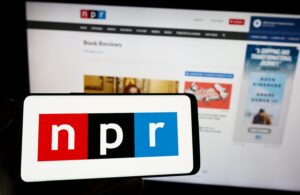Lawmakers grill PBS, NPR chiefs about ‘anti-American’ media bias in fiery hearing
Republican lawmakers clashed with the leaders of National Public Radio and Public Broadcasting Service in a fiery congressional hearing on Wednesday, accusing the broadcasters of partisan news…

Republican lawmakers clashed with the leaders of National Public Radio and Public Broadcasting Service in a fiery congressional hearing on Wednesday, accusing the broadcasters of partisan news coverage at taxpayers’ expense.
Rep. Marjorie Taylor Greene, R-Georgia, who chairs the new DOGE subcommittee, convened the hearing, which was titled “Anti-American Airwaves: Holding the heads of NPR and PBS Accountable.”
Republican lawmakers accused the organizations of downplaying or outright ignoring major national stories including the Hunter Biden laptop scandal and the origins of COVID-19. Democrats insisted that the hearing was a form of “political theater.”
NPR’s chief executive, Katherine Maher, and PBS’ chief executive, Paula Kerger, defended their news coverage as educational, essential to local communities, and a vital way for rural Americans to access the news.
Greene opened the hearing by noting the “more than half a billion dollars” in taxpayer funds for public radio and television and said that “a big chunk of this subsidy” flows to NPR and PBS.
A lot has changed since Congress first authorized public broadcasting in 1967, she continued, due to the internet and social media making news accessible to rural and remote areas.
“At the same time, NPR and PBS have increasingly become radical, left-wing echo chambers for a narrow audience of mostly wealthy, white, urban liberals and progressives, who generally look down on and judge rural America,” Greene said.
Other Republicans agreed, with Rep. James Comer, R-Kentucky, saying that he no longer saw a role for public media and that the outlets shouldn’t receive a “penny” in federal funds. “I don’t even recognize the station anymore,” he said. “It’s not news. I feel like it’s propaganda.”
Maher defended NPR’s role as delivering “unbiased, non-partisan, fact-based reporting to Americans.” In her time leading NPR – a role she took a year ago – Maher said she has taken actions to address concerns of bias, including hiring new editors to “ensure we’re giving fair airtime to different voices and issues.”
Throughout the hearing, Republican lawmakers peppered Maher about old tweets in which she called for reparations, said America is “addicted to white supremacy” and referred to President Donald Trump as a “deranged racist sociopath.” She acknowledged some regret for those tweets and said her views have evolved over the past several years. Maher also admitted that NPR erred when it ignored the Hunter Biden laptop story when it first emerged.
“I do want to say that NPR acknowledges we were mistaken in failing to cover the Hunter Biden laptop story more aggressively and sooner,” she said.
Several lawmakers also referenced a bombshell exposé published last year by NPR veteran editor Uri Berliner, in which he detailed how the outlet “lost America’s trust” and said that an “open-minded spirit no longer exists within NPR.” In that essay, he wrote that there were “87 registered Democrats working in editorial positions” at NPR’s Washington, D.C., newsroom and “zero Republicans.” Maher said she agreed that those statistics were “concerning.”
PBS, meanwhile, defended its role as helping to “educate, engage, and inspire the American people.”
“There’s nothing more American than PBS,” Kerger, the organization’s CEO, said. She argued that PBS stations are essential as they provide needed local news coverage, educational programming, and public safety and emergency alerts.
One in four Americans believe Congress should defund NPR and PBS, Pew Research polling released Wednesday indicates, while 43% say the organizations should continue to receive federal funding and 33% of Americans aren’t sure about it. There are wide partisan divides on the topic, Pew noted, as far more Republicans oppose the federal funding than Democrats.
Republicans are also much less likely to get regular news from either public media organization. “32% of Democrats say they regularly get news from NPR, vs. 9% of Republicans,” Pew noted, with similar data for PBS.
A day before the heated congressional hearing, Trump told reporters that he would “love” to remove federal funding for the broadcasters and that he would be “honored to see it end.”
“I think it’s very unfair, it’s been very biased – the whole group,” Trump said. “The kind of money that’s being wasted, and it’s a very biased view.”



